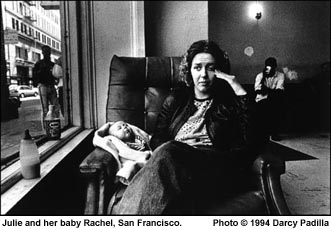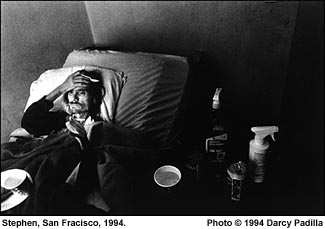|
DARCY
PADILLA, a photographer who does social documentary work, has undertaken
a decade-long study of AIDS among the poor of San Francisco. She has
received grants from the Alexai Foundation for World Peace, the John
Simon Guggenheim Memorial Foundation and a Soros fellowship:
 I
first started photographing AIDS in San Francisco ten years ago. One
person I’ve documented, Julie Baird, has lived for nine years with
the disease. She and Jack, both of whom had tested positive, had a child,
Rachel, in February of 1993. A few months later, I made this picture
of Julie and Rachel in their S.R.O., where I had met them. Julie and
Jack were speed freaks. Both had been living on the street since they
were 13. Both had been abused. Since then, Jack has died (in 1998),
several hours after his birthday. Julie is still alive and has had three
children since Rachel. She’s been in and out of prison, having
done time for kidnapping one of her children from a hospital after testing
positive for drug use. I
first started photographing AIDS in San Francisco ten years ago. One
person I’ve documented, Julie Baird, has lived for nine years with
the disease. She and Jack, both of whom had tested positive, had a child,
Rachel, in February of 1993. A few months later, I made this picture
of Julie and Rachel in their S.R.O., where I had met them. Julie and
Jack were speed freaks. Both had been living on the street since they
were 13. Both had been abused. Since then, Jack has died (in 1998),
several hours after his birthday. Julie is still alive and has had three
children since Rachel. She’s been in and out of prison, having
done time for kidnapping one of her children from a hospital after testing
positive for drug use.
 Then
there are people like Stephen, whom I documented for three years. He
was dead before he died. He was in so much human pain. I believe that
he had given up, but his body hadn’t. His one wish was to return
home to be with his mother. She had told him that he could, but she
never sent for him. He lived in an S.R.O., practicing a lifestyle that
she didn’t approve of: alcoholic, drug-addict, gay. His lover had
died the year before. He didn’t want to die alone in the hospice
that he had been transferred to. So he asked me to be with him when
he died. I brought him his comforts: a fifth of Popov vodka and ice
cream. This was a relief to him because of all the sores in his mouth.
My pictures and my presence allowed him not to pass away in isolation,
unnoticed. Then
there are people like Stephen, whom I documented for three years. He
was dead before he died. He was in so much human pain. I believe that
he had given up, but his body hadn’t. His one wish was to return
home to be with his mother. She had told him that he could, but she
never sent for him. He lived in an S.R.O., practicing a lifestyle that
she didn’t approve of: alcoholic, drug-addict, gay. His lover had
died the year before. He didn’t want to die alone in the hospice
that he had been transferred to. So he asked me to be with him when
he died. I brought him his comforts: a fifth of Popov vodka and ice
cream. This was a relief to him because of all the sores in his mouth.
My pictures and my presence allowed him not to pass away in isolation,
unnoticed.
In this area of San Francisco, which is one of the poorer communities
in the city, there are just so many people who are infected. People
don’t realize how prevalent AIDS is now in impoverished areas.
And the reason we don’t seem to care is that as a nation we don’t
think about the urban poor, the people I call “the permanent poor.”
For me the issue is not just AIDS. The issue is the urban poor and all
of their issues. In some cities, it’s still as bad as it was in
the 1930s and 40s. My whole thesis is that until we start approaching
poverty as a society (outside of Jobfare and Welfare and education),
until we start addressing physical and emotional abuse, addition and
disease, the urban poor population will continue to grow. We need to
look at AIDS and the poor in the same way we look at wars such as those
in Bosnia or elsewhere: It’s a global crisis that requires global
attention.
|
 I
first started photographing AIDS in San Francisco ten years ago. One
person I’ve documented, Julie Baird, has lived for nine years with
the disease. She and Jack, both of whom had tested positive, had a child,
Rachel, in February of 1993. A few months later, I made this picture
of Julie and Rachel in their S.R.O., where I had met them. Julie and
Jack were speed freaks. Both had been living on the street since they
were 13. Both had been abused. Since then, Jack has died (in 1998),
several hours after his birthday. Julie is still alive and has had three
children since Rachel. She’s been in and out of prison, having
done time for kidnapping one of her children from a hospital after testing
positive for drug use.
I
first started photographing AIDS in San Francisco ten years ago. One
person I’ve documented, Julie Baird, has lived for nine years with
the disease. She and Jack, both of whom had tested positive, had a child,
Rachel, in February of 1993. A few months later, I made this picture
of Julie and Rachel in their S.R.O., where I had met them. Julie and
Jack were speed freaks. Both had been living on the street since they
were 13. Both had been abused. Since then, Jack has died (in 1998),
several hours after his birthday. Julie is still alive and has had three
children since Rachel. She’s been in and out of prison, having
done time for kidnapping one of her children from a hospital after testing
positive for drug use. Then
there are people like Stephen, whom I documented for three years. He
was dead before he died. He was in so much human pain. I believe that
he had given up, but his body hadn’t. His one wish was to return
home to be with his mother. She had told him that he could, but she
never sent for him. He lived in an S.R.O., practicing a lifestyle that
she didn’t approve of: alcoholic, drug-addict, gay. His lover had
died the year before. He didn’t want to die alone in the hospice
that he had been transferred to. So he asked me to be with him when
he died. I brought him his comforts: a fifth of Popov vodka and ice
cream. This was a relief to him because of all the sores in his mouth.
My pictures and my presence allowed him not to pass away in isolation,
unnoticed.
Then
there are people like Stephen, whom I documented for three years. He
was dead before he died. He was in so much human pain. I believe that
he had given up, but his body hadn’t. His one wish was to return
home to be with his mother. She had told him that he could, but she
never sent for him. He lived in an S.R.O., practicing a lifestyle that
she didn’t approve of: alcoholic, drug-addict, gay. His lover had
died the year before. He didn’t want to die alone in the hospice
that he had been transferred to. So he asked me to be with him when
he died. I brought him his comforts: a fifth of Popov vodka and ice
cream. This was a relief to him because of all the sores in his mouth.
My pictures and my presence allowed him not to pass away in isolation,
unnoticed.